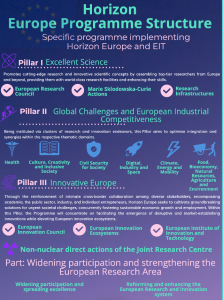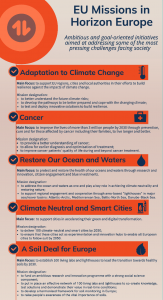Horizon Europe Programme
The Horizon Europe Programme (hereinafter referred to as the Programme) is one of the constituent elements of the long-term Multiannual Financial Framework (MFF), which is the EU’s framework programme for research and innovation.
The Programme became the ninth EU Framework Programme (FP9). It is based on Horizon 2020, the eighth framework programme, which came to an end on December 31, 2020.
The overall Programme’s budget is EUR 95.5 billion (including EUR 5.4 billion from the EU’s New Generation Europe Programme). The implementation of the Programme is designed for a seven-year period, namely 2021-2027.
Key Programme dates:
- March-April 2019 – the European Parliament and the Council of the European Union have tentatively agreed on the Horizon Europe Programme.
- April 17, 2019 – the European Parliament gave its approval to the provisional agreement. The European Parliament endorsed the provisional agreement on Horizon Europe, the EU’s research and innovation programme for 2021-2027, following negotiations with co-legislators. Carlos Moedas, Commissioner for Research, Science, and Innovation, welcomed the vote, highlighting the significance of investing in research and innovation for Europe’s future.
- December 11, 2020 – EU institutions achieved a political consensus on Horizon Europe and established a budget of €95.5 billion in current prices, which incorporates €5.4 billion from the EU’s Next Generation – Recovery Fund.
- April 28, 2021 – the Framework Programme for Research and Innovation, laying down its rules for participation and dissemination, and repealing Regulations (EU) No 1290/2013 and (EU) No 1291/2013, adopted with the Regulation (EU) 2021/695 of the European Parliament and of the Council; this document entered into force retroactively from January 1, 2021.
The Programme aims to achieve the following three principal objectives:
- to strengthen science and technology in the EU by increasing funding for highly skilled personnel and cutting-edge research;
- to promote the innovative competitiveness of the industry, in particular by supporting measures and actions with a high technological and innovative impact on the economy;
- to address global and societal challenges, and provide effective responses and strategic solutions that have a positive impact on the life quality of European citizens.
Therefore, the Programme’s architectonic design, similar to its predecessor, the Horizon 2020 Programme, envisages the formation of three pillars. However, unlike the Horizon 2020 Programme, the European Innovation Council (EIC) for the first time became an integral part of Horizon Europe’s third pillar, with its own organisational structure and research support tools.
Furthermore, among the principal novelties of the Programme are the following:
- five research and innovation missions were introduced; this enables to set clear goals to address specifi
 c contemporary societal challenges; among these five missions, the European Commission has identified the following: adaptation to climate change, including societal changes; cancer; maintaining clean oceans and natural water resources; carbon-neutral and smart cities; and preserving soil health for sustainable food development;
c contemporary societal challenges; among these five missions, the European Commission has identified the following: adaptation to climate change, including societal changes; cancer; maintaining clean oceans and natural water resources; carbon-neutral and smart cities; and preserving soil health for sustainable food development; - strengthening open research practices that provide prompt access to all scientific publications, thus promoting responsible management of research data to ensure their accessibility, interoperability and ability to be easily accessed and reproduced;
- a new approach to partnerships based on the principles of strategic orientation, a systematic approach and consolidated interaction tools.
For more information on the Horizon Europe Programme in presentation format (in English), please click here.